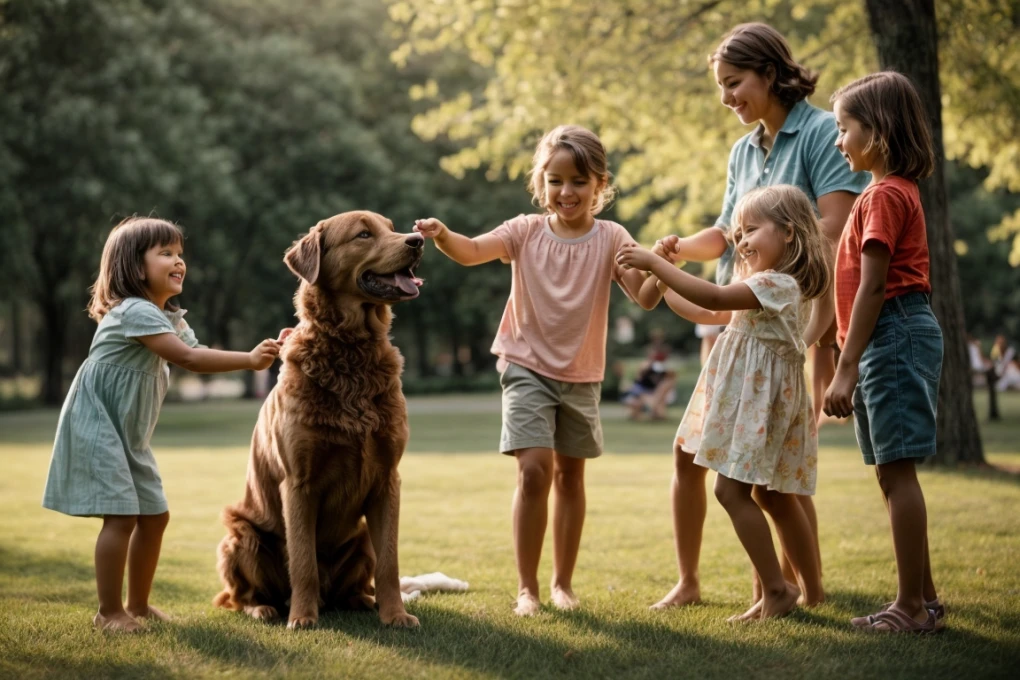Do Chesapeake Bay Retrievers Make Good Family Dogs?

Chesapeake Bay Retrievers are known for their intelligence, loyalty, and athleticism. They are also known for being strong-willed and independent. This can make them a good choice for some families, but not for others.
If you are considering getting a Chesapeake Bay Retriever, it is important to do your research and make sure that they are a good fit for your lifestyle and family. This blog post will discuss the pros and cons of Chesapeake Bay Retrievers as family dogs, as well as some tips for training and socializing them.
Pros of Chesapeake Bay Retrievers as family dogs
- Intelligent and trainable: Chesapeake Bay Retrievers are intelligent dogs that are relatively easy to train. They are eager to please their owners and are quick to learn new commands.
- Loyal and protective: Chesapeake Bay Retrievers are fiercely loyal to their families and will protect them at all costs. They make excellent watchdogs and will bark to alert you of any strangers or danger.
- Athletic and active: Chesapeake Bay Retrievers are high-energy dogs that need plenty of exercise. They enjoy playing fetch, swimming, and going for walks. If you are an active family, a Chesapeake Bay Retriever can be a great companion.
- Good with children: Chesapeake Bay Retrievers are generally good with children, but it is important to supervise all interactions between children and dogs. Chesapeake Bay Retrievers can be large and strong dogs, so it is important to teach children how to interact with them safely.
Cons of Chesapeake Bay Retrievers as family dogs
- Strong-willed and independent: Chesapeake Bay Retrievers are known for being strong-willed and independent dogs. This can make them challenging to train and socialize. It is important to be firm and consistent with training a Chesapeake Bay Retriever.
- High-energy and active: Chesapeake Bay Retrievers are high-energy dogs that need plenty of exercise. If you are not an active family, a Chesapeake Bay Retriever may not be the right dog for you.
- Prone to barking: Chesapeake Bay Retrievers are prone to barking, especially at strangers and other dogs. This can be a problem if you live in a close-knit neighborhood or have young children.
- Can be aggressive: Chesapeake Bay Retrievers can be aggressive towards other dogs, especially if they are not properly socialized. It is important to socialize your Chesapeake Bay Retriever from a young age.
Tips for training and socializing Chesapeake Bay Retrievers
- Start training early: Chesapeake Bay Retrievers are intelligent dogs that are relatively easy to train. It is important to start training your Chesapeake Bay Retriever from a young age, before they develop bad habits.
- Be firm and consistent: Chesapeake Bay Retrievers can be strong-willed dogs, so it is important to be firm and consistent with training. Use positive reinforcement training methods and reward your Chesapeake Bay Retriever for good behavior.
- Socialize your Chesapeake Bay Retriever: Chesapeake Bay Retrievers can be aggressive towards other dogs if they are not properly socialized. It is important to socialize your Chesapeake Bay Retriever from a young age. Expose them to different people, places, and situations.
- Provide plenty of exercise: Chesapeake Bay Retrievers are high-energy dogs that need plenty of exercise. Make sure to give your Chesapeake Bay Retriever at least an hour of exercise each day.
Common problems and troubleshooting
- Barking: Chesapeake Bay Retrievers are prone to barking, especially at strangers and other dogs. If your Chesapeake Bay Retriever is barking excessively, there are a few things you can do to try to stop them. First, make sure that your Chesapeake Bay Retriever is getting enough exercise. A tired dog is a good dog! Second, try to identify what is triggering your Chesapeake Bay Retriever's barking. Once you know what is triggering the barking, you can start to work on desensitizing them to it. For example, if your Chesapeake Bay Retriever barks at strangers, you can gradually expose them to strangers in a controlled environment and reward them for staying calm.
- Aggression: Chesapeake Bay Retrievers can be aggressive towards other dogs, especially if they are not properly socialized. If your Chesapeake Bay Retriever is showing signs of aggression, it is important to consult with a professional dog trainer or behaviorist. They can help you to develop a training plan to address the aggression.
Conclusion
Chesapeake Bay Retrievers can make good family dogs for active families with older children. However, it is important to remember that they are strong-willed and independent dogs that require firm and consistent training